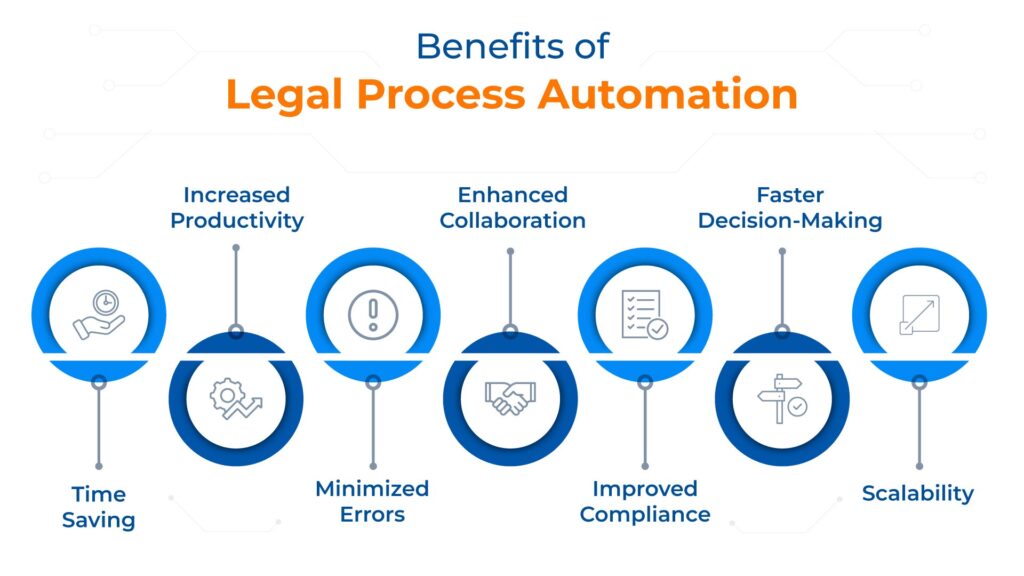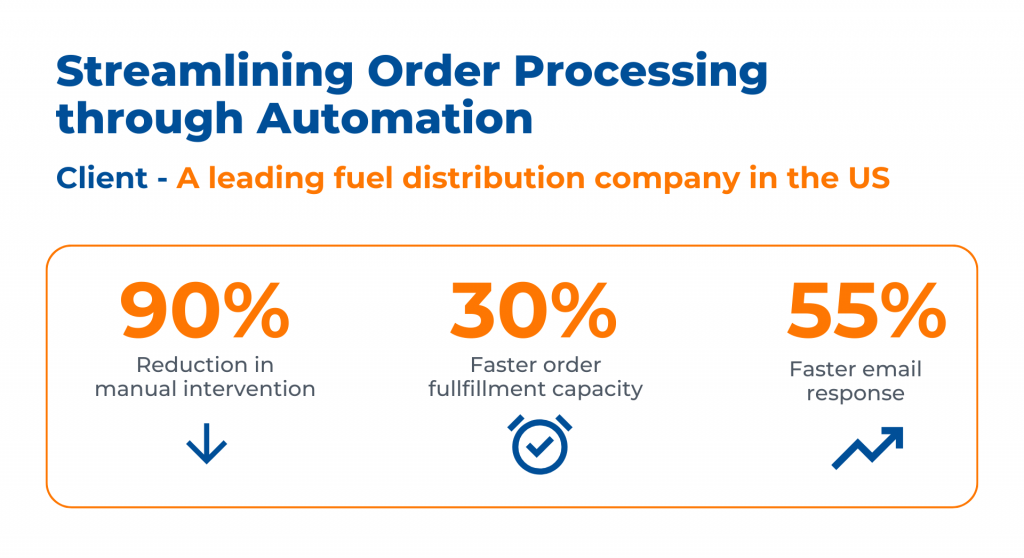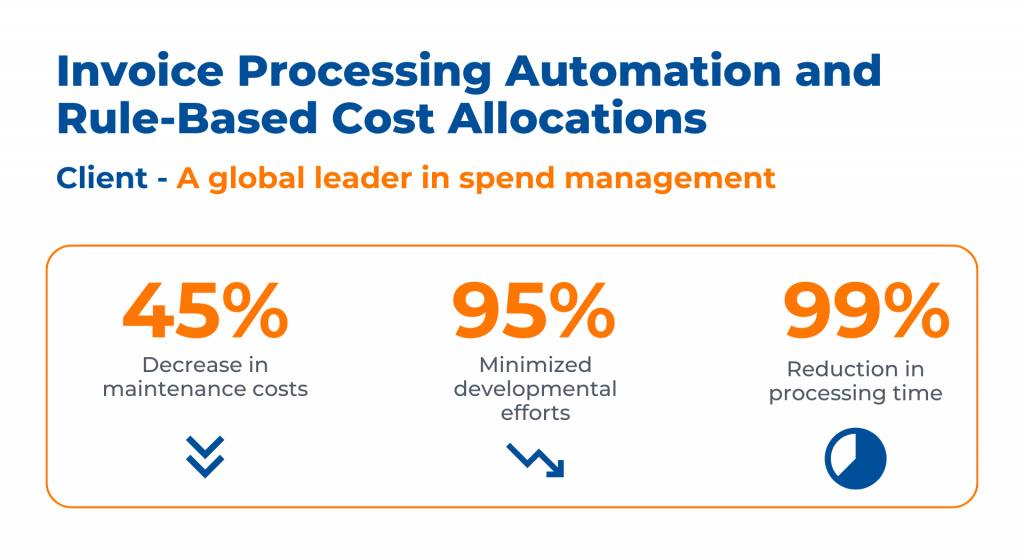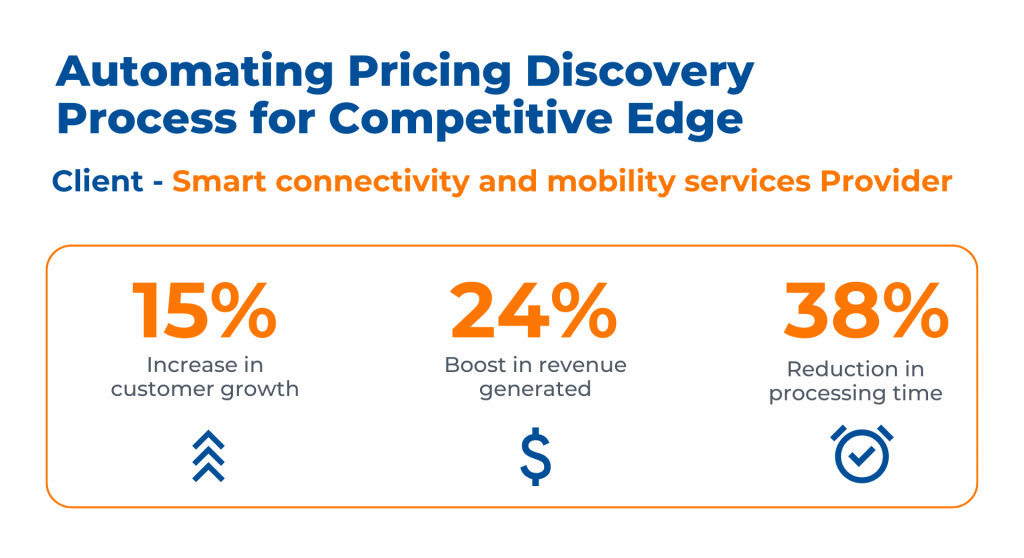AI has the potential to automate approximately 44% of legal tasks in the United States, which is the second highest after administrative work, as per the report by Golman Sachs. The impact of automation in the legal industry is far more disruptive compared to many other professions or industries.
The legal sector, which previously relied heavily on manual tasks, is now turning to automation to improve efficiency, minimize costs, and ensure compliance. Regardless of whether it is a small law firm or a large-scale corporate legal establishment, recognizing the benefits of legal process automation can help increase the productivity, efficiency, and eventually, ensure better outcomes for your clients.
In this article, we’ll explore the different ways in which legal process automation can revolutionize the legal sector. We will discuss the many benefits of automating legal processes, the different tools and technologies that can be employed, and some best practices to implement automation solutions. So, let’s delve into legal process automation and find out how it can be a game-changer for the legal profession.
What is Legal Process Automation?

Luminance, a leading AI platform for lawyers, leverages the power of Artificial Intelligence to comprehend complex documents, allowing users to carry out due diligence with greater efficiency. It was trained to mimic the cognitive processes of a legal professional.
Legal process automation involves the use of technology and software applications to streamline and optimize various legal processes, such as document drafting, contract reviewing, compliance monitoring, and legal research. By automating repetitive and time-consuming tasks, legal professionals can focus on more complex and strategic aspects of their work.
Traditionally, lawyers and other legal professionals used technology to assist them in their day-to-day functions but haven’t seen them as a complete replacement for many strenuous and redundant tasks involving manual efforts. But with rapid advancements in technology and the emergence of Generative AI and large language models the scenario has changed.
Legal process automation revolutionizes the legal industry. By utilizing technologies like Robotic Process Automation (RPA) and Artificial Intelligence (AI) to automate routine tasks, lawyers can increase their productivity, save costs, and improve collaboration within their team. As new advancements in automation continue to emerge, it is expected that more law firms will embrace this technology to stay competitive in the evolving legal landscape.

What Are the Various Legal Services That Can Be Automated?

1. Contract Drafting
Contract drafting is one of the key areas where automation is making a significant impact. Drafting, reviewing, and tracking contracts can be a time-consuming and error-prone task. With the use of artificial intelligence and machine learning, these processes can be automated. Automation helps extract key information from contracts, ensure compliance, and even generate personalized contract templates
2. Legal Research
Legal professionals spend countless hours sifting through volumes of legal documents to find relevant information. With legal process automation, software programs can perform comprehensive searches across vast databases and provide relevant results quickly. This saves lawyers valuable time and allows them to focus on more strategic tasks.
Read More- What is Bias-Variance Tradeoff?
3. Document Reviewing
Reviewing documents for litigation or during mergers and acquisitions can be complex and time-consuming. Automation can help in analyzing large volumes of data for inconsistencies, discrepancies, or potential risks, reducing human error and expediting the overall review process.

4. Compliance Monitoring
Automation helps in tracking legislative and regulatory changes and provides real-time updates to ensure that lawyers and other legal professionals stay up-to-date with the compliance requirements.. Automation tools empower legal teams to make timely adjustments, mitigating compliance risks and promoting a proactive approach to legal adherence.
5. Due Diligence
Automation streamlines due diligence, meticulously scanning documents in mergers or acquisitions. By extracting important relevant information, it expedites decision-making processes, reduces human error, and ensures a comprehensive understanding of legal implications, fostering more efficient business transactions.
6. Client Onboarding
Automation simplifies the client onboarding process by gathering and validating mandatory information. This not only expedites the onboarding process but also ensures compliance with regulatory standards. By automating these procedures, legal teams enhance accuracy, reduce workload, and facilitate a seamless client onboarding experience.
Also read: How automation drives growth in logistics industry
7 Key Benefits of Legal Workflow Automation
Amberlo, a user-friendly cloud-based law practice management platform, helps law firms to streamline their legal workflows from lenient intake to invoicing, and add up to 40 billable hours per lawyer per month.
1. Time Saving
legal proceedings are often time bound and often require a lot of manual effort. Legal professionals are constantly juggling multiple cases,abundant paperwork, and stringent timelines. Manual tasks, such as drafting legal documents or performing legal document review, can be extremely time-consuming and prone to error. This is where legal process automation comes in handy.
2. Increased Productivity
Legal workflow automation involves the utilization of advanced technologies like RPA, AI/ML, and Gen AI to streamline and automate repetitive tasks in the legal process, ultimately increasing efficiency and productivity. These automated systems can generate documents, track deadlines, organize case files, and perform other necessary tasks with precision and consistency.

3. Minimized Errors
Handling the legal documents and data entry manually can result in mistakes, which can have adverse consequences for legal cases. With automation, lawyers can ensure accuracy by eliminating human errors, minimizing the risk of missing information or filing incorrect documents. This will help in maintaining the reputation of lawyers and legal firms as well as enhancing overall client satisfaction.

4. Enhanced collaboration
Automation allows multiple stakeholders, including attorneys, paralegals, and clients to access information and work on a unified platform. Additionally, automated systems can streamline communication by sending timely reminders, updates, and notifications to all relevant parties involved in a case.
5. Improved Compliance
By incorporating predefined rules and compliance checks into automated processes, it ensures that every step aligns with the existing regulatory requirements. This not only minimizes the chances of non-compliance but also mitigates associated legal risks and consequences.
6. Faster Decision-Making
Automation can significantly reduce decision-making time by providing legal professionals with access to pertinent information. With seamless integration of data retrieval, analysis, and communication tools, automation ensures that legal practitioners can promptly respond to emerging challenges. Faster decision-making not only enhances the agility of legal teams but also contributes to effective and timely outcomes in legal matters, benefiting clients and stakeholders.
7. Scalability
In instances of increased number of cases and additional workload, automation enables law firms entities to efficiently handle the rising demand without the need for a significant surge in manual effort. By automating routine and repetitive tasks, legal professionals can focus on more complex and strategic aspects of their work, allowing the organization to scale its operations effectively.

Steps to Implement Legal Process Automation Successfully

Implementing legal process automation successfully requires careful planning and consideration. Here are some key steps to ensure a smooth and effective transition:
1. Assessing the Existing Processes
It is crucial to conduct a thorough assessment of your current processes and identify areas that can benefit from automation. Look for tasks that are time-consuming, repetitive, and prone to errors. Once you have identified these pain points, prioritize them based on their impact on efficiency and the potential for automation. Remember, not every process needs to be automated, so focus on those that will have the most significant impact on productivity and resource allocation.
2. Choose the Right Technology
Find the right technology solution that aligns with your specific needs and goals. There are various legal process automation tools available in the market, each with its own features and capabilities. Take the time to research and evaluate different options, considering factors such as integration capabilities, scalability, security, and user-friendliness. Involving key stakeholders, such as lawyers, paralegals, and IT personnel, in the decision-making process can help ensure that the chosen solution meets the requirements of all parties involved.
3. Define Clear Objectives
After selecting the legal process automation tool, you must define clear objectives and establish a roadmap for implementation. Outline the desired outcomes and draft a plan to achieve them. Involve all the stakeholders and provide them with the necessary training and resources to adapt to the new automated workflows. Continuous communication and feedback will help address any challenges that may arise during the implementation phase.

4. Customization and Configuration
Customize automation workflows to suit specific legal processes, modifying rules, triggers, and decision points within the chosen platform. This ensures a seamless alignment between automation capabilities and the unique requirements of the legal framework.
5. Development of Automation Workflows
Create and refine automation workflows, considering task sequences and decision trees. Test these workflows in a controlled environment to identify and resolve issues, ensuring optimal performance in real-world scenarios.
6. Security and Compliance Considerations
Implement robust security measures to protect sensitive legal data throughout the automation process. Ensure that the automated systems adhere strictly to regulatory requirements, ensuring the integrity and confidentiality of legal information within the automated solution.
7. Evaluation
Assess the impact of legal process automation on your organization. Review performance metrics and gather feedback from users regularly to measure the effectiveness of the automated processes. Use this data to identify areas for further improvement and make necessary modifications to optimize efficiency and productivity. Automation is not a one-time activity and often requires continuous monitoring and refinement.
Check out: Customer Service Automation: Proven ways to increase efficiency
How to Choose the Right Automation Tools for Transforming Your Legal Procedures?
With the ever-increasing demands for efficiency and cost-effectiveness, legal professionals are turning to automation tools to streamline their processes and transform their services. But with numerous options available, choosing the right automation tools for legal process automation can be a daunting task. Here are some recommendations that help you choose the right tool:
Firstly, identify the goals or objectives of your legal practice. Every firm has unique requirements based on their practice areas and requires varying levels of automation. Assessing your current workflows and identifying the pain points will help you determine the areas where automation can make the most significant impact.
It’s important to consider the features and functionalities offered by various automation tools. Look for tools that address your unique needs, such as contract management, document review, or case analysis. Integrate the tools seamlessly with your existing systems and software, as compatibility is essential for a successful implementation.
Take into account the scalability and ease of use of the automation tools. As your legal practice grows, so will your automation requirements. Therefore, opt for tools that can adapt and expand as your needs evolve. User-friendliness is crucial for smooth adoption and integration by your team, so consider tools with intuitive interfaces and comprehensive support.

Role of Robotic Process Automation (RPA) in Enhancing Legal Processes

According to Strategic Market Research, 98% of IT experts believe that automating business operations is essential for increasing their profits.
Legal procedures can be extremely complex and time-consuming, often requiring extensive paperwork and redundant tasks. Robotic Process Automation (RPA) can address these challenges, enhance legal processes, and improve efficiency.
RPA involves the use of software robots to automate rule-based and repetitive tasks. In the legal sector, this technology can automate processes like document creation, contract drafting and reviewing, and compliance monitoring. By eliminating the need for manual intervention, RPA not only streamlines these processes but also minimizes errors and maximizes accuracy.
85% of large-scale enterprises used RPA by 2022 and its utilization is only seeing an upward trend
RPA enables lawyers and legal professionals to spend their time on more critical and strategic tasks, such as analyzing cases and providing legal advice instead of immersing themselves in a mountain of paperwork. It improves productivity and allows legal teams to focus on high-value activities, leading to better outcomes and client satisfaction..
Robotic Process Automation (RPA) has the capability to extract useful information from various legal documents and generate reports in a quicker time. This streamlines the process of data analysis, making it easier for legal professionals to access, analyze, and interpret information. Moreover, RPA helps in ensuring compliance by running automated checks on legal documents, minimizing the risk of errors or non-compliance.

What is the Impact of AI in the Legal Sector?

73% of businesses in US use AI to automate some or all aspects of their operations, according to PwC
Artificial intelligence (AI) has undoubtedly been transforming industries across the globe, and the legal sector is no exception. With the emergence and adoption of AI in their day-to-today activities, legal professionals are experiencing a significant shift in their traditional way of doing things. From legal research to contract analysis, AI can automate various aspects of the legal process.
AI-powered tools have the ability to handle repetitive tasks, such as document review and due diligence. This has not only sped up processes but also increased efficiency and accuracy.
AI has also revolutionized legal research. With the vast amount of legal information available, AI algorithms are capable of analyzing and categorizing legal documents more efficiently than humans. This allows lawyers to quickly access required information, saving valuable time. AI-powered research tools provide insights and recommendations based on past cases, enabling legal professionals to make more informed decisions.
While Artificial Intelligence has undoubtedly made significant advancements in the legal sector, it is important to note that it is not a replacement for human lawyers. The expertise and critical thinking capabilities of legal professionals cannot be replicated by AI. Instead, AI serves as a powerful tool that enhances the efficiency and accuracy of legal processes.
Also read: Supply Chain Automation: Ways to level up efficiency
Hurdles in Implementing Legal Process Automation
Resistance to Change
Many legal professionals are accustomed to traditional practices, and the thought of shifting to automated processes can be intimidating. It is important to address this resistance by demonstrating the benefits of automation and showing how it can free up time for more strategic and complex tasks, they can be encouraged to welcome the change.
Integration with Existing Systems
Each legal organization has its unique requirements, making it necessary to tailor the automation software accordingly. This customization process can be complex and time-consuming. Moreover, integrating the new system with the existing infrastructure may pose technical challenges.
Data Security
Data Security and confidentiality are critical concerns when implementing legal process automation. Legal professionals often deal with vast amounts of sensitive and confidential client information. Ensuring that the automation software meets stringent data protection standards is essential. Implementing robust security measures, such as encryption, user access controls, and regular system audits, is crucial to safeguarding client and organization data.

Take a Look at Some of Kanerika’s Successful Automation Projects
Case 1: Implementing Automated Solutions to Boost Order Fulfillment Capacity by 30% in the Supply Chain Industry
Client’s Challenges:
- Customers experienced significant delays in order delivery due to the time-intensive manual order processing system
- Manual entry caused errors in order creation, eroding customer trust and leading to loss of business
- Delayed email confirmations on order status left customers uncertain about their order progress, revealing operational inefficiency
Kanerika’s Solutions:
- Implemented UiPath automation for swift conversion of customer emails into NetSuite orders, speeding up order processing
- Reduced manual tasks, virtually erasing order errors, restoring trust, and slashing error-related costs
- Streamlined email confirmations with Sales Order numbers, enhancing transparency and customer confidence in responsiveness
Business Impact:

Case 2: Boosting Efficiency with 40% Faster Cost Allocation Strategies: Empowering a Global leader in Spend Management Analytics
Client’s Challenges:
- Difficult to implement cost allocation strategies for each customer, which led to complexity and time consumption
- Delays in invoice processing led to customer penalties and rework, impacting operational efficiency and profitability
- Ever-changing allocation strategy environments led to operations and maintenance nightmares
Kanerika’s Solutions:
- Streamlined the cost allocation process with intelligent automation, improving efficiency and time-to-market
- Implemented a rules-based engine for scalable and intelligent cost allocation, reducing custom deployment time to <5 mins
- Enabled customer-specific business rules and configurable cost allocation strategies, increasing flexibility for customer
Business Impact:

Case 3: 30% Increase in Resource Utilization by Increasing Travel Booking for a Leader in Transport Industry
Client’s Challenges:
- Manual efforts led to revenue loss due to delayed competitive pricing analysis
- Manual work introduced errors, compromising the reliability of collected data
- The absence of a centralized data center hindered streamlined investigation and access to current information
Kanerika’s Solutions:
- Automated travel booking through an intelligent pricing discovery process, ensuring a smooth customer experience
- Activated a Bot to navigate various websites and capture pricing data to populate the discovery database for reliable insights utilizing data analysis in research
- Automated data analytics for pricing mechanism, enhancing service visibility and customer satisfaction
Business Impact:

Automate and Enhance Your Legal Processes with Kanerika’s Path-breaking Automation Solutions
Legal process automation is revolutionizing the way law firms and corporations manage their legal processes.
Kanerika, a leading IT services company, offers expert automation solutions tailored specifically to address the challenges in the legal sector. Kanerika’s path-breaking automation solutions are designed to simplify and streamline complex legal processes which allows legal professionals to focus on high-value tasks while leaving repetitive and mundane tasks to automated systems.
By leveraging technologies like Robotic Process Automation (RPA), Artificial Intelligence and Machine Learning (AI/ML), and Generative AI, the tech experts at Kanerika can automate your legal procedures, enhancing efficiency and boosting revenue. With the help of our comprehensive suite of automation services, we have enabled businesses to adapt and optimize their investments..
We believe that by embracing automation, law firms can focus on delivering higher-quality legal services while optimizing resources and staying ahead in today’s competitive legal landscape.

Frequently Asked Questions
What is automation in law?
Legal automation uses technology to handle routine legal tasks, freeing up lawyers for more complex work. Think software that drafts contracts, analyzes documents for key clauses, or even predicts case outcomes. This boosts efficiency and reduces costs in legal practices. Ultimately, it’s about leveraging technology to improve the speed and accuracy of legal processes.
What is an example of process automation?
Process automation replaces manual, repetitive tasks with software. Think of automatically sending confirmation emails after an online order – that’s automation in action. It streamlines workflows, freeing up human employees for more complex and creative work. Essentially, it’s using technology to make things happen without direct human intervention for routine steps.
What is RPA in the legal industry?
Robotic Process Automation (RPA) in law firms automates repetitive, rule-based tasks like document review, data entry, and e-discovery. It frees up lawyers and paralegals to focus on higher-value work, improving efficiency and reducing human error. Think of it as digital assistants handling the tedious stuff, making the legal process faster and more cost-effective. Essentially, RPA boosts productivity and client service.
What are the 4 types of automation?
Automation isn’t just one thing; it’s a spectrum. We generally see it categorized into process, business process, robotic process, and finally, intelligent automation. These levels build on each other, adding complexity and AI capabilities as you go up the spectrum. Essentially, it’s about automating increasingly intricate tasks and workflows.
What are the three laws of automation?
There aren’t formally defined “three laws of automation,” like Asimov’s robot laws. However, we can think of three guiding principles: 1) Automation should enhance, not replace, human capabilities. 2) Prioritize safety and ethical considerations throughout the automation process. 3) Ensure transparency and accountability in automated systems to prevent bias and unintended consequences.
What is the automation process?
Automation is streamlining tasks by using technology to replace human actions. It involves creating systems that perform repetitive processes without direct human intervention, boosting efficiency and freeing up human workers for more complex jobs. Think robots on an assembly line or software scheduling appointments – it’s about making things work faster and more reliably. The goal is optimized output with minimal manual effort.
Will AI automate law?
No, AI won’t fully automate law, but it will revolutionize it. Think of AI as a powerful tool for lawyers, handling tedious tasks like document review, not replacing the human element of judgment, strategy, and client interaction. The legal field requires nuanced understanding of ethics and human context, things AI currently lacks. Ultimately, it’s about augmentation, not automation.
What are the three basic types of automation?
Automation boils down to three core types: Process automation handles repetitive tasks within a defined system. Task automation focuses on individual actions, often using software bots. Finally, business process automation (BPA) orchestrates multiple processes to streamline entire workflows, encompassing both process and task automation.
What are three examples of automation?
Automation streamlines tasks, replacing human effort with machines or software. Think of a self-checkout at a grocery store (handling transactions), a robotic arm in a factory (assembling products), or email spam filters (sorting messages). These all automate processes, boosting efficiency and often accuracy. Essentially, it’s about making things happen without constant human intervention.
What is automation in process control?
Automation in process control means using technology to manage industrial processes without constant human intervention. It involves sensors, computers, and actuators working together to maintain desired conditions (temperature, pressure, etc.) This ensures consistent product quality, increases efficiency, and improves safety by handling hazardous tasks. Essentially, it’s like giving a complex machine a self-regulating brain.









